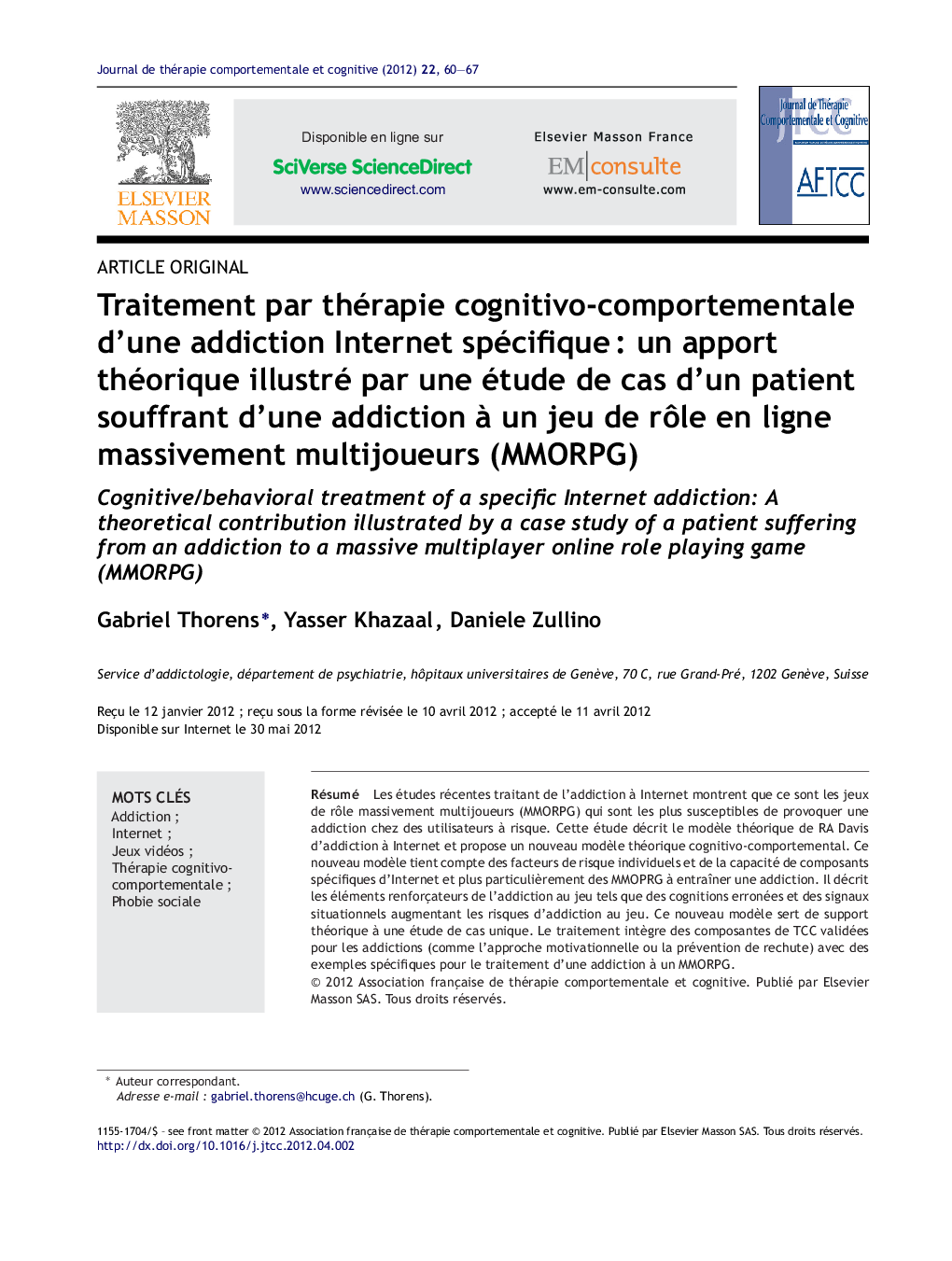| کد مقاله | کد نشریه | سال انتشار | مقاله انگلیسی | نسخه تمام متن |
|---|---|---|---|---|
| 934827 | 923711 | 2012 | 8 صفحه PDF | دانلود رایگان |
عنوان انگلیسی مقاله ISI
Traitement par thérapie cognitivo-comportementale d'une addiction Internet spécifique : un apport théorique illustré par une étude de cas d'un patient souffrant d'une addiction à un jeu de rôle en ligne massivement multijoueurs (MMORPG)
دانلود مقاله + سفارش ترجمه
دانلود مقاله ISI انگلیسی
رایگان برای ایرانیان
کلمات کلیدی
موضوعات مرتبط
علوم پزشکی و سلامت
پزشکی و دندانپزشکی
روانپزشکی و بهداشت روانی
پیش نمایش صفحه اول مقاله

چکیده انگلیسی
The Davis cognitive behavioral model for Internet addiction is presented and new model is suggested. The main difference with the Davis model is that, in our opinion, an individual can become addicted to the Internet without having a related disorder (which we would call primary pathological use). There are addictive factors (such as operant conditioning similar to that of pathological gambling) in some applications such as online gambling, which may cause an individual to become an addict. However, problematic secondary use (online casinos, pornography) is the expression of a pre-existing pathology (addiction or other). A case of Internet addiction is then presented (specifically addiction to massively multiplayer online role play [MMORPG]) and CBT treatment for it. Internet addiction is not a mental disorder listed in international classifications (DSM or CID). Thus, currently, there is no consensual definition of the disorder. Epidemiological studies show prevalence rates ranging from 0.9% to 38%. The most commonly accepted definition is based on DSM-IV-TR criteria associated with pathological gambling. It focuses on problematic Internet use other than for professional and institutional reasons with symptoms such as loss of control, withdrawal signs and obsessive thoughts relating to use. Davis is the first to propose a cognitive-behavioral model for pathological Internet use, which differentiates between two types of problems linked to Internet use: 1) specific pathological Internet use (SPIU): the Internet is used as a means of expressing and heightening the intensity of a pre-existing pathology (like pathological gambling); 2) generalized pathological Internet use (GPIU): Davis describes generalized misuse of the Internet which does not have any pre-existing equivalents. He describes use without specific goals (random surfing, emails and chats) with emphasis on the social aspect (chat, social networks). According to our critical analysis of his model, he does not mention online gambling and MMORPGs in particular. In our opinion, MMORPGs are situated between SPIU and GPIU. Indeed, it is often the specific use of a single game, which brings it into the category of SPIU. However, unlike gambling, for example, there is no equivalence outside the Internet and the social element is very important in MMORPGs. The proposed new model takes into account individual risk factors and the ability of specific Internet components, and in particular MMORPGs, to cause addiction. This new model provides theoretical support for a unique case study. It concerns a patient who has always been a videogame player but, on discovering MMORPGs, starts to present symptoms of Internet addiction leading to negative social and mental consequences (isolation, employment difficulties, aggravation of social phobia and depressive symptoms). Treatment incorporates CBT components validated for addictions (such as motivational approach or relapse prevention), with specific examples for the treatment of MMORPG addiction. Indeed, it is necessary to take into account the specific nature of MMORPGs and to work with the patient on aspects resulting in negative symptoms. For example, self-observation allows the patient to appreciate the amount of time and energy invested in the game (the equivalent of two full-time jobs in our case). Describing specific phases of the game during a session allows the patient to become aware of the painstaking and absurd aspects of the game mechanics (e.g. waiting several hours before undertaking a mission that has a high chance of failure). We also show the importance of the therapist's support for the patient in the task of returning to normal daily activities outside the game. After ten sessions over 5Â months, the patient significantly improved in several aspects: the social phobia score decreased from 71/100 at the time of assessment to 23/100 on the Liebowitz scale and the specific scale of Internet addiction (IAT) from 72/100 to 12/100. The patient gave up playing online (he was playing 100Â hours a week on average at the time of assessment), but he continued unproblematic computer activity (messaging and business use). This clinical illustration shows the possible serious adverse effects. Like other addictions, Internet addiction is multifactorial, and it is necessary to take into account individual weakness, comorbidities and social environment. But, in addition, we must avoid confusion between different types of online activities. As a result, certain types of Internet use carry a higher risk of addiction. MMORPGs have similarities with pathological gambling due to conditioning methods used within them, and are likely to cause addiction. However, as with gambling, the vast majority of users do not develop an addiction.
ناشر
Database: Elsevier - ScienceDirect (ساینس دایرکت)
Journal: Journal de Thérapie Comportementale et Cognitive - Volume 22, Issue 2, June 2012, Pages 60-67
Journal: Journal de Thérapie Comportementale et Cognitive - Volume 22, Issue 2, June 2012, Pages 60-67
نویسندگان
Gabriel Thorens, Yasser Khazaal, Daniele Zullino,